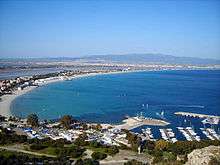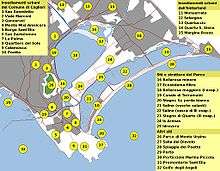Poetto
Poetto is Cagliari's main beach. It stretches for about eight kilometers, from Sella del Diavolo (the Devil's Saddle) up to the coastline of Quartu Sant'Elena. Poetto is also the name of the district located on the western stretch of the strip between the beach and Saline di Molentargius (Molentargius's Salt Mine).

- For the Empire ship also known as "Poetto", see Empire Stella.
Etymology

The name of the beach supposedly derives from an Aragon Tower named "Poet's Tower", which is still visible above the Sella del Diavolo (Devil's Saddle). Another hypothesis is that the name 'Poetto' is linked to the Catalan pohuet (small well), referring to the numerous wells and tanks scattered on the Sella del Diavolo for the storage of rainwater. The name could also derive from the Spanish word puerto, since the first part, called Marina Piccola it is also a port.
History

Until 1900 Poetto beach was not very popular with Cagliaritans who instead preferred the west side of the gulf, with the beaches of Sa Perdixedda (in Sardinian "small stone") and Giorgino. It was during the first decades of the 20th century that people began to appreciate the white dunes of Poetto and that the first seaside resorts ( "Lido" and "D'Aquila"), bars and even a Hospital (Ospedale Marino) was built. A number of casotti (coloured wooden constructions halfway between a dressing room and a tiny house on the seashore) were built, imitating the first Lido's "cabine" (Dressing rooms). The casotti, however, were entirely removed in 1986 for sanitation reasons. Due to their removal, the overcrowding, and a lack of erosion prevention work, there was gradual dispersal of sand and a fast erosion of the shoreline in the nineties.
To avoid the disappearance of the beach a rainbowing[1] was tried on the Cagliari side in 2002: the sand was reclaimed and sprayed onto the beach using a fleet of dredging ships a few miles from the shore, in an attempt to restore the beach to its original size. However, the result was not as successful as expected: the white, fine-grained sand was replaced by sand of a completely different color, size and consistency. Years later the situation has not improved, and the quartese stretch, which initially remained intact after a few years, has now begun to have the same problems due to the removal of sand by the wind, people and, of course, the sea.

Administrative division
Poetto is popularly divided into "fermate" (stops), which means the various stretches of beach are recognized by the ordinal number of bus stops or urban lines linking the city centre district. The most popular is the 1st stop, adjacent to the port of Marina Piccola, just below the Sella del Diavolo. Very famous and popular are the 2nd (D'Aquila), 3rd (Lido) 4th and the 6th, home of an old Hospital and of major events (Championships of Beach Volleyball, Beach soccer, Beach Football and concerts). Around the 10th stop the coastline belonging to the Comune of Quartu Sant'Elena begins.
Nightlife
Poetto is also the entertainment district for Cagliari's nightlife and attracts many tourists. Especially from June to September, one can listen to live music, go to discos, participate in dance lessons or karaoke or simply walk on the seashore. The most popular clubs are Il Lido, Plan B, Sax Beach and Frontemare.
See also
- Golfo degli Angeli
- Quartu Sant'Elena
External links
![]()
References
- http://www.ilpoetto.com/poetto.html Information on the rainbowing case (Italian)